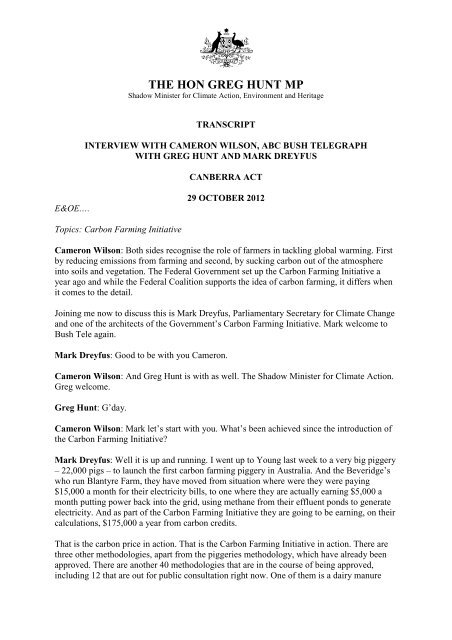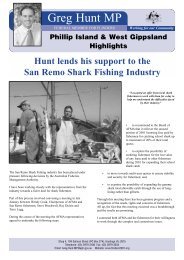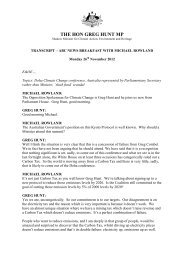ABC Bush Telegraph Interview with Cameron ... - Greg Hunt MP
ABC Bush Telegraph Interview with Cameron ... - Greg Hunt MP
ABC Bush Telegraph Interview with Cameron ... - Greg Hunt MP
You also want an ePaper? Increase the reach of your titles
YUMPU automatically turns print PDFs into web optimized ePapers that Google loves.
THE HON GREG HUNT <strong>MP</strong><br />
Shadow Minister for Climate Action, Environment and Heritage<br />
TRANSCRIPT<br />
INTERVIEW WITH CAMERON WILSON, <strong>ABC</strong> BUSH TELEGRAPH<br />
WITH GREG HUNT AND MARK DREYFUS<br />
CANBERRA ACT<br />
E&OE….<br />
29 OCTOBER 2012<br />
Topics: Carbon Farming Initiative<br />
<strong>Cameron</strong> Wilson: Both sides recognise the role of farmers in tackling global warming. First<br />
by reducing emissions from farming and second, by sucking carbon out of the atmosphere<br />
into soils and vegetation. The Federal Government set up the Carbon Farming Initiative a<br />
year ago and while the Federal Coalition supports the idea of carbon farming, it differs when<br />
it comes to the detail.<br />
Joining me now to discuss this is Mark Dreyfus, Parliamentary Secretary for Climate Change<br />
and one of the architects of the Government’s Carbon Farming Initiative. Mark welcome to<br />
<strong>Bush</strong> Tele again.<br />
Mark Dreyfus: Good to be <strong>with</strong> you <strong>Cameron</strong>.<br />
<strong>Cameron</strong> Wilson: And <strong>Greg</strong> <strong>Hunt</strong> is <strong>with</strong> as well. The Shadow Minister for Climate Action.<br />
<strong>Greg</strong> welcome.<br />
<strong>Greg</strong> <strong>Hunt</strong>: G’day.<br />
<strong>Cameron</strong> Wilson: Mark let’s start <strong>with</strong> you. What’s been achieved since the introduction of<br />
the Carbon Farming Initiative?<br />
Mark Dreyfus: Well it is up and running. I went up to Young last week to a very big piggery<br />
– 22,000 pigs – to launch the first carbon farming piggery in Australia. And the Beveridge’s<br />
who run Blantyre Farm, they have moved from situation where were they were paying<br />
$15,000 a month for their electricity bills, to one where they are actually earning $5,000 a<br />
month putting power back into the grid, using methane from their effluent ponds to generate<br />
electricity. And as part of the Carbon Farming Initiative they are going to be earning, on their<br />
calculations, $175,000 a year from carbon credits.<br />
That is the carbon price in action. That is the Carbon Farming Initiative in action. There are<br />
three other methodologies, apart from the piggeries methodology, which have already been<br />
approved. There are another 40 methodologies that are in the course of being approved,<br />
including 12 that are out for public consultation right now. One of them is a dairy manure
methodology, which is pretty similar to the piggery manure methodology that the<br />
Beveridge’s are using. So we are up and running.<br />
<strong>Cameron</strong> Wilson: How many Australian farmers are trading in the credits like the<br />
Beveridge’s?<br />
Mark Dreyfus: At the moment they are the first because that is the one that we launched last<br />
week. But as Andrew Spencer from Australian Pork, the trade organisation that came out to<br />
the launch <strong>with</strong> me, said hundreds of Australian piggeries are now going to be looking at this<br />
methodology. He expects very many of them to take up the methodology and be carbon<br />
farming on their piggery using the approved methodology.<br />
<strong>Cameron</strong> Wilson: It’s four months since the price on carbon was introduced. Would you<br />
have been hoping more than one farming business was trading in credits by now?<br />
Mark Dreyfus: No not at all. We are at the start of a very long transition here. We are at the<br />
start of projects that are going to last for many decades. It is important that we get the<br />
methodologies right. It is important that we have scientific integrity and rigour because<br />
people who are buying Australian Carbon Farming Initiative credits want to know those<br />
credits represent real reduction in carbon pollution. They want to know that they have<br />
scientific integrity and I don’t think there is any problem about this. About taking the time to<br />
get the methodologies right and taking some time to make sure projects that are approved are<br />
going to be producing real reductions in carbon pollution.<br />
<strong>Cameron</strong> Wilson: <strong>Greg</strong> <strong>Hunt</strong> how do you assess the progress so far under the Carbon<br />
Farming Initiative?<br />
<strong>Greg</strong> <strong>Hunt</strong>: Look I think it is a very important idea and is what we set out in the Direct<br />
Action program. It’s what the government resisted and then ultimately adopted <strong>with</strong> the<br />
Carbon Farming Initiative. So it has huge potential. Enormous potential for reduction of<br />
emissions. Unfortunately it is proceeding at an incredibly slow pace. One project on farm in<br />
all of Australia. So that’s it, one project. And the reason I think is very simple. There’s been<br />
an incredibly slow process of approving methodologies and there are restrictions <strong>with</strong>in the<br />
program, which go completely contrary to the experience and desire of the farm community. I<br />
was in Dubbo just last week. I understand Mark was there the day after me speaking <strong>with</strong><br />
farmers. And they said ‘this could be a very high potential program, but it is so slow and the<br />
restrictions are so great and doesn’t live <strong>with</strong> our understanding of the way farms operate.’ So<br />
bureaucracy is killing what potentially could be a very high potential low cost means of<br />
emissions reduction.<br />
<strong>Cameron</strong> Wilson: Doesn’t the slow progress, the relatively slow progress just highlight it’s a<br />
cautious and responsible approach that is being undertaken at the moment and that the<br />
integrity that is key to this, the integrity of the program, is being maintained?<br />
<strong>Greg</strong> <strong>Hunt</strong>: Well I think when you see that you have got four out of forty-four<br />
methodologies after all of the time that the Government has been talking about this that are<br />
approved, that is not caution, that’s bureaucratic delay. When you have one project around<br />
the country. One farm project, I don’t think that can be seen as a success. Now I hope this is<br />
successful. I think it has huge potential. But the farmers themselves were saying to me,<br />
whether it was the New South Wales Farmers Association, or individual farmers, they were<br />
all saying the current rules, the current regime are so bureaucratic that they are very hesitant
to participate. So we want to streamline it. We think it can offer huge potential and that<br />
would be good for the environment and it would be good for farmers.<br />
<strong>Cameron</strong> Wilson: How would you streamline it <strong>with</strong>out undermining its integrity?<br />
<strong>Greg</strong> <strong>Hunt</strong>: Well I think there are two things we need to do. One is to make sure that we are<br />
actively processing the methodologies, or for people who may not be engaged in the fine<br />
detail of the Carbon Farming Initiative, the ways in which you can actually reduce emissions<br />
and get credit for that. The second thing is we want to get on <strong>with</strong> the business of ensuring<br />
that the farmers have an option. Now Mark and I disagree on this. Some may choose to go to<br />
the 100 years, our view is that there ought to be a 25 year option for accreditation and that is<br />
the overwhelming view of the farmers and farm groups <strong>with</strong> whom I have spoken <strong>with</strong>,<br />
because they have said the current regime, which doesn’t have to be this way, completely<br />
excludes a vast bulk of farmers from being able to participate. So we will work <strong>with</strong> them.<br />
We can do this. It can be streamlined and at the end of the day if we are capturing carbon in<br />
trees or in soil, if we are reducing methane from livestock processers, that is a real emissions<br />
reduction and that is all that matters.<br />
<strong>Cameron</strong> Wilson: Mark Dreyfus, <strong>Greg</strong> <strong>Hunt</strong> raises a couple of points there. Let’s deal <strong>with</strong><br />
the 100 year ruling in just a moment. But first of all, is it a fair point that the bureaucracy is<br />
too slow and is putting farmers off? We have heard the same complaint from farmers on this<br />
program.<br />
Mark Dreyfus: When you are starting something new there will be a time to set<br />
methodologies up. There will be a time to get procedures right, but one thing that is clear is<br />
we have to have integrity in the reductions of carbon pollution. Without integrity the entire<br />
scheme will fall to the ground because carbon credits under the Carbon Farming Initiative<br />
will be quickly seen to be worthless. It is vital, particularly at the starting point, that you<br />
maintain integrity, maintain scientific integrity. And that is what we have got. I make no<br />
apology whatsoever in taking time to get the science right on each and every one of the<br />
methodologies and properly reviewing the projects that are submitted for approval as carbon<br />
credit providers.<br />
<strong>Cameron</strong> Wilson: <strong>Greg</strong> <strong>Hunt</strong> also raised the 100 year rule there. Can you explain to us what<br />
that is first of all?<br />
Mark Dreyfus: What <strong>Greg</strong> is talking about there is of course only in relation to sequestration<br />
methodologies, not simple reduction methodologies. It doesn’t have any bearing on the pig<br />
manure methodology, which is about reducing emissions of dangerous methane from effluent<br />
ponds. It won’t have any bearing on dairy methodology. It doesn’t have any bearing on the<br />
capture of gas from landfills methodology, which has already been approved and the projects<br />
that are already up and running there. There are four projects that are already approved and<br />
operating under that landfill gas capture methodology, so we are not just talking about the<br />
one piggery, we have got the other four landfill projects as well. But for sequestration<br />
projects, the present international rules require 100 years. That’s what is regarded as<br />
permanence and for good reason. It’s to make sure that reductions sequestration of carbon<br />
that is achieved through those methodologies, like planting methodologies, is permanent<br />
sequestration. That’s what people who buy carbon credits generated using those<br />
methodologies are looking for. And quite simply they won’t buy credits that are produced<br />
using this so called ‘25 year period.’ It is just a con job for <strong>Greg</strong> to be suggesting that would<br />
fly internationally or that would even fly here in Australia. The market for credits is for
permanent sequestration, it is not for fake sequestration, which is what the 25 years would<br />
amount to.<br />
<strong>Cameron</strong> Wilson: So it is not negotiable from your point of view?<br />
Mark Dreyfus: It is not up to me to negotiate. The international rules agreed under the Kyoto<br />
Protocol require 100 years. That is what is regarded as permanence and it is simply foolish to<br />
suggest – it is leading the farmers up the garden path in effect – it is foolish to suggest that<br />
you should have a methodology that is based on a 25 year sequestration because the credits<br />
won’t be worth anything. The reason they won’t be worth anything is that those that want to<br />
buy carbon credits as offsets want to know that it represents real reductions.<br />
<strong>Cameron</strong> Wilson: <strong>Greg</strong> <strong>Hunt</strong> who do you see as buying these so called 25 year carbon<br />
credits?<br />
<strong>Greg</strong> <strong>Hunt</strong>: Well look there are a series of options here. The first thing is that <strong>with</strong> respect to<br />
Mark, he just went through a whole series of different methodologies, which don’t require a<br />
century long commitment. And you don’t need a century long commitment. What you do<br />
need is scientific integrity that reduces emissions, that allows farmers to participate. We are<br />
involved in the process as a country of helping to define the international rules. Farm groups<br />
are involved in that. This isn’t difficult stuff. This is about shaping our environment. And the<br />
problem at the moment is we are getting 100 per cent of nothing. And 100 per cent of<br />
nothing, is still nothing. So the government has set in place a system, which in this respect is<br />
destined to fail. It is simply not going to reduce emissions, it is not equated to the real world<br />
in which farmers live and therefore Australian farmers are being locked out on two fronts.<br />
They are being locked out in terms of domestic participation and we have just had rules go<br />
through the Parliament where an agreement <strong>with</strong> Europe, where they have been locked out of<br />
any engagement <strong>with</strong> Europe. Not until 2015 not 2016 or 2017, but until 2018. So the farmers<br />
have been given a dud deal on two fronts and been locked out twice now.<br />
Mark Dreyfus: Well I have to interrupt there and say <strong>Cameron</strong> that <strong>Greg</strong> is simply<br />
misleading there as he has done for so many months now in relation to all aspects of the<br />
carbon price. The demand for carbon credits right here in Australia, from the large polluters<br />
in Australia, who are paying the carbon price is more than 30 times greater than any expected<br />
production of credits under the Carbon Farming Initiative. So we have got hugely greater<br />
demand right here in Australia for the carbon credits, which are going to be produced. And it<br />
is clear that what we have from this Opposition is talking down of Australia’s prospects,<br />
misleading the public about the carbon price in all its respects. And the key thing is under a<br />
Coalition Government there would be no carbon price and <strong>with</strong>out a carbon price you don’t<br />
have a carbon market and that’s the end of the Carbon Farming Initiative as well. That’s the<br />
bottom line here.<br />
<strong>Cameron</strong> Wilson: The Coalition has said that it is committed to the Carbon Farming<br />
Initiative. I want to push on. I want to look at soil carbon as well. I think you have both made<br />
your points around this issue. My guests on <strong>Bush</strong> <strong>Telegraph</strong> are Mark Dreyfus, Parliamentary<br />
Secretary for Climate Change. Also <strong>Greg</strong> <strong>Hunt</strong>, the Shadow Minister for Climate Action.<br />
<strong>Greg</strong> <strong>Hunt</strong>, back to you. How important is soil carbon or storing carbon in soil as a<br />
centrepiece to the Coalition’s policy?
<strong>Greg</strong> <strong>Hunt</strong>: Well it is one of many different options. We think it has potentially the greatest<br />
opportunity of any means of abatement, but it is one of many. Our approach is to have a<br />
reverse auction so in the way that Australia set up probably the most effective water buyback<br />
system in the world. In the same way that the government is now looking to reduce<br />
consumption of water through infrastructure based on the lowest cost per mega litre of water,<br />
through infrastructure investments. We use that precise approach of a buyback – a carbon<br />
buyback – whether it is soil carbon, revegetation, reforestation, whether it is capture of waste<br />
coal mine gas, waste landfill gas, energy efficiency, cleaning up not closing down power<br />
stations, any one of a numerous range of abatement activities would be available to reduce<br />
emissions. And we will do it on the lowest cost basis so as we get the maximum benefit for<br />
Australia. We will simply hold a reverse auction. It is a very well established system. It is<br />
exactly what the government does <strong>with</strong> water and endorses on water. It is the same<br />
mechanism across two different types of resources and it is simple, it is a way forward and<br />
soil carbon would have an important role in that.<br />
<strong>Cameron</strong> Wilson: And where does the money come from to pay for this?<br />
<strong>Greg</strong> <strong>Hunt</strong>: We are providing $300 million, $500 million and $750 million over the first<br />
three years. It is exactly as the government buys back water. The difference is we will be<br />
funded in our scheme and we are not trying to push this off until 2024.<br />
<strong>Cameron</strong> Wilson: So the public pays for the carbon sequestration under your plan. Whereas<br />
business pays under the Government’s plan.<br />
<strong>Greg</strong> <strong>Hunt</strong>: Well the public does pay under the Government’s plan that they pay in the form<br />
of electricity prices, gas prices, fertiliser prices, refrigeration prices and the farm community<br />
is living the reality of the carbon tax at the moment. We saw a 15 per cent electricity rise for<br />
the first quarter announced only last week. Two thirds of that were from the carbon tax. So<br />
the public is paying, but they are paying in a way that is incredibly inefficient. Prices go up,<br />
but emissions don’t go down.<br />
<strong>Cameron</strong> Wilson: So finally <strong>Greg</strong> <strong>Hunt</strong> if I could ask you to score the current system out of<br />
ten, what would you give it?<br />
<strong>Greg</strong> <strong>Hunt</strong>: Four out of ten and the reason I would say that is the intention is right, the focus<br />
is right, the methodology and timeframes are unjustifiable.<br />
<strong>Cameron</strong> Wilson: Mark Dreyfus you have failed on <strong>Greg</strong> <strong>Hunt</strong>’s account, who would you<br />
score the system so far?<br />
Mark Dreyfus: I am scoring it very, very highly because that is Australian farmers are telling<br />
me. They are really enthusiastic about this scheme and are looking forward to being able to<br />
use the methodologies on their farms and <strong>Greg</strong> didn’t answer your question about soil carbon.<br />
That’s the bottom line. The soil carbon according to the Liberal Party, is capable of<br />
producing up to half of the emissions reductions, the pollution reductions…<br />
<strong>Greg</strong> <strong>Hunt</strong>: …well absolutely and I am more confident now than I ever was…<br />
Mark Dreyfus: …that is just feeding another myth to Australian farmers. It is a nonsense.<br />
CSIRO has made it absolutely clear that soil carbon, at best, is capable of producing about<br />
half to one per cent of the emissions reductions that we need. And for <strong>Greg</strong> <strong>Hunt</strong> to ignore
the science, ignore what the CSIRO is saying is simply to mislead again on this point. And<br />
Direct Action itself is using taxpayers’ money, <strong>Cameron</strong>, to throw at a few large companies<br />
in the hope that they will cut carbon pollution. There won’t be any money left over for the<br />
Carbon Farming Initiative under the Liberal’s plan. And there won’t be any money, full stop,<br />
for the Carbon Farming Initiative because they want to kill the carbon price. It is the carbon<br />
price that is needed to provide funds for the Carbon Farming Initiative.<br />
<strong>Cameron</strong> Wilson: Well I know we would need an entire program to debate the science<br />
around soil carbon. So I note also Mark Dreyfus that you didn’t answer that question there<br />
about the score out of ten. A question that <strong>Greg</strong> <strong>Hunt</strong> did answer.<br />
Mark Dreyfus: I will give it a nine, <strong>Cameron</strong>. How is that? I am not claiming perfection but<br />
I will give it a nine out of ten.<br />
<strong>Greg</strong> <strong>Hunt</strong>: I will just finish off, <strong>Cameron</strong>, to say we can do this. We can do it <strong>with</strong>out an<br />
electricity tax and I think farmers know it and I think they just want to get on <strong>with</strong> the<br />
business and be able to capture carbon in soils, revegetation, reforestation by reducing<br />
emissions through land sector and livestock processes.<br />
<strong>Cameron</strong> Wilson: We will have to leave it there. Thank you gentlemen very much for<br />
joining us today. <strong>Greg</strong> <strong>Hunt</strong>, the Shadow Climate Action Minister and Mark Dreyfus, the<br />
Parliamentary Secretary for Climate Change.<br />
ENDS






